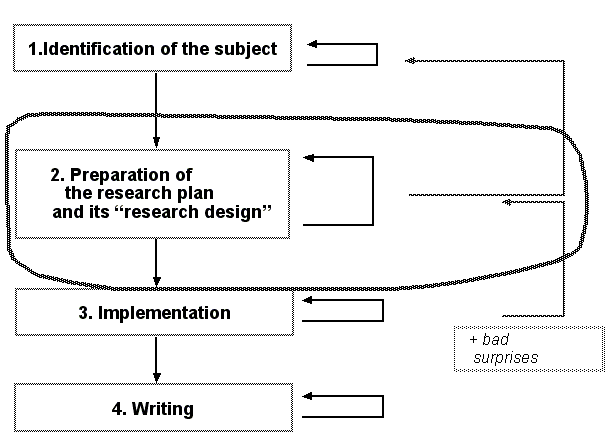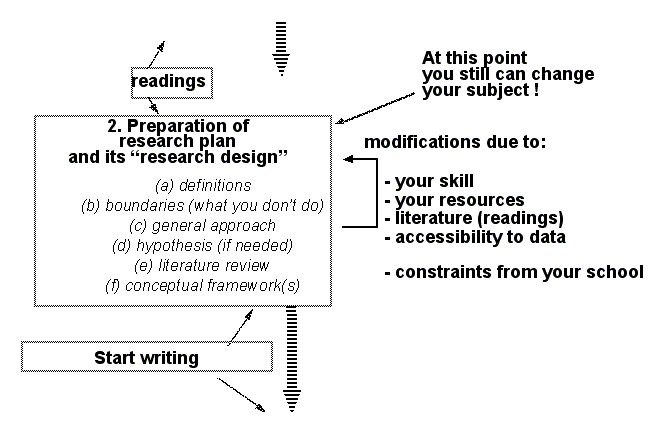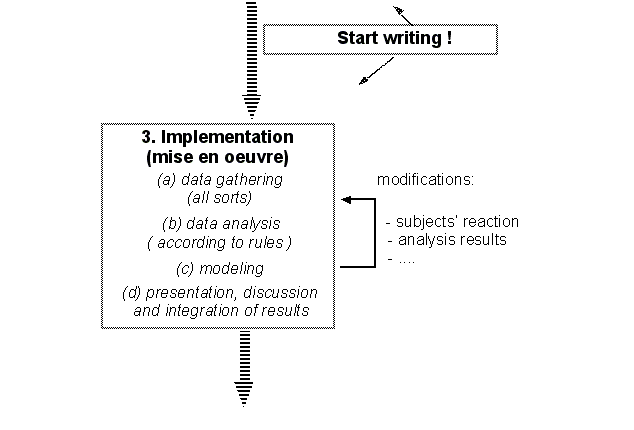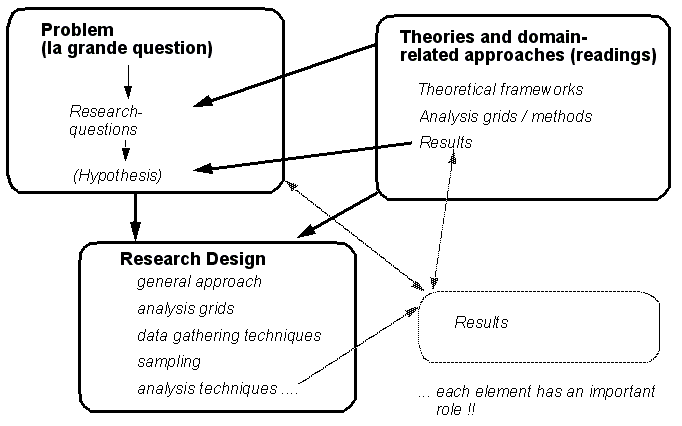Methodology tutorial - the research plan
<pageby nominor="false" comments="false"/>
Research Design for Educational Technologies - The research plan
This is part of the methodology tutorial (see its table of contents).
This entry only gives a rather short overview of what we mean by "research plan". It will not help you prepare a research plan, but just define the elements that should be part of a research plan ...
Place of the research plan
Important elements of the research plan
Anticipation of main research activity (implementation)
Telling what you are really going to do during your research is rather important. It will lower the risk of getting stuck and also help you to estimate resources (basically time) you will need !
Elements of a typical research plan
- Note: You may have to adapt this list to fit formal requirements from your institution or methodology constraints. As you will see later, various research types do implement a somewhat different logic and form.
Element: Your research subject
- the big question (general subject in one sentence)
- explicitation of the big question
- at least a few sentences that demonstrate its practical and theoretical interests.
- motivations and various ends
- delimitations (what you are not going to do)
Element: Objectives of your research
- Say clearly what you wish to achieve, because this will determine research questions and/or hypothesis.
- Valorization (if appropriate): how can you transfer results in a "real context" ?
Element: theory
- Start with a short and synthetic text describing and discussing the "state of the art" in your subject area.
- Be sure to mention the major publications. Read the ones you quote from !
- You may point out inconsistencies and gaps (adds additional interest to your project !)
- Identify theories and conceptual models that you will use.
- Maybe add your modifications and present both at the end
- Make sure that you define all concepts
- A lot of concepts are controversial, e.g. pedagogical effectiveness, efficiency, ...
Only introduce theory that is relevant for your research and make sure to write a synthesis. Each section of your theory part should end with a conclusion that you later can use to justify your research questions.
See the advice on [[Methodology tutorial - finding a research subject|readings and ideas] in the "Finding a research subject" article.
Element: Research questions and/or hypothesis
Make explicit your research subject, main goal and objectives
Choose from (or combine):
- Open research questions (but make an effort to be as precise as possible).
- Research questions formulated as working hypothesis.
- Real hypothesis that are based on theory.
- In theory-oriented research, formulate hypothesis that postulate causalities
- Bad: "I postulate that my e-learning design will work"
- Good: "Conditions for successful implementation of an e-learning design in the context XXX of are ....."
- Bad: "ICT doesn’t work in schools"
- Good: "Critical variables A, B, C for successful implementation of e-learning are ...". Then, make explicit A, B, C as causal rules.
Element: Approach & methodology
- Description of your overall approach (for example "experimental design", "survey study", "usability study", "instructional design")
- Description of data gathering and analysis techniques (for example, semi-directive interviews, content analysis ...)
Note: Make sure to explain your methodological designs for all levels of analysis !
- at the organizational level (if you are interested in this question),
- at the individual level (e.g. students, teachers)
Basic principle:
- show convincingly how you are going to answer each research question !
- Obey guidelines dictated by the general approach
- in particular: be careful with experimental designs (rules are strict !)
- (more details below)
Approach
- Briefly describe the overall approach you are using
- Discuss analysis grids that will measure important concepts
- You also can discuss conceptual frameworks (if not done before)
- For experimental studies: clearly describe the experimental conditions
Measures and material
- Data gathering techniques: (interviews, observations, surveys, ....)
- Sampling strategies (or justification of singular case selection)
- For qualitative in-depth studies
- sampling of interviews, events, etc.
- For experimental studies
- there is a strict way of doing things ! You have to describe in detail experimental conditions, materials used, sampling conditions etc.
Analyses
- Shortly describe analysis techniques (both qualitative and quantitative)
- If necessary: point out which methods need development (e.g. analysis of student-student interaction in a CSCW environment)
Element: Information sources
- Bibliography (use a real standard, like APA !)
- Documents to analyze
- Information interviews, etc., ....
Element: Work Agenda
(see module [Methdology tutorial - planning techniques])
The research plan is a whole
Major elements must be linked together
Recall: Research plan = what + why:
|
What ? |
A good question ! |
|
|
A (or more) good conceptual framework(s) |
| |
|
How? |
Consider that your research plan should be ... |
|
|
Be realistic !Prove that you have ... |
| |
|
A whole ! |
Integration ! |
|
Before you believe that your are done
Check again:
- Theoretical feasibility
- You can’t do it all by yourself, check the literature (if not already done so, find "ground breaking" articles)
- In particular: theoretical frameworks, analysis grids, theoretical statements.
- organize an interview with a least an academic and a domain expert
- Inventory of approaches and methods
- there are some constraints, you can’t study everything in any way (but you do have choice !)
- finding a good design always is an iterative process (so don’t worry if your first version looks bad)
- Identify your main approach :
- look at similar research
- if you want to prove things and make causality claims, you need comparison !
- use qualitative approaches to explore and to understand, quantitative to confirm, generalize, prove, ...
- Methodological feasibility
- Dress a list of all the concepts that appear in your research questions (and hypothesis if you have)
- Take each concept apart for its dimensions,
- Operationalize each empirical dimension (make it is measurable)
- Does your theory part really relate to your empirical / practical part ?
- Make sure that you can produce needed data and then analyze them
- do you know how to gather data (make observations, design questionnaires, make interviews, ...
- can you handle these data ?



